Computer system architecture Text №1 Термины текста architecture

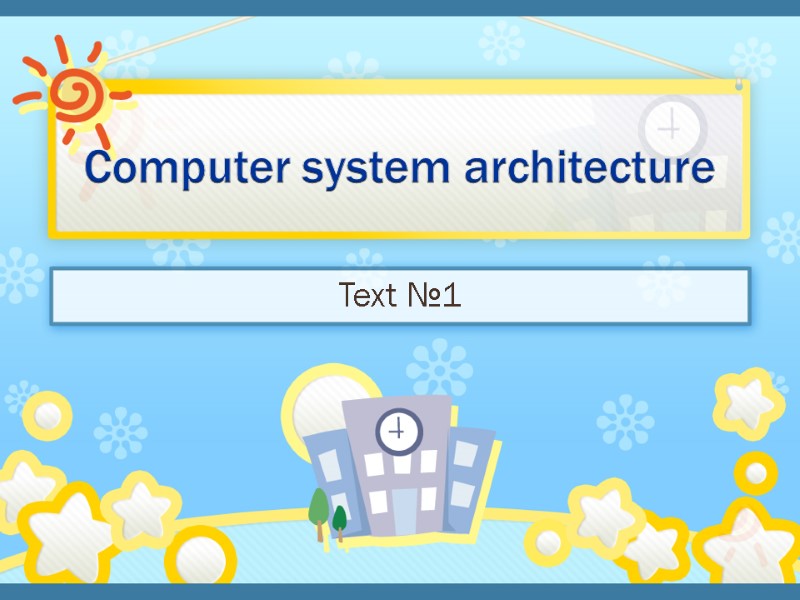

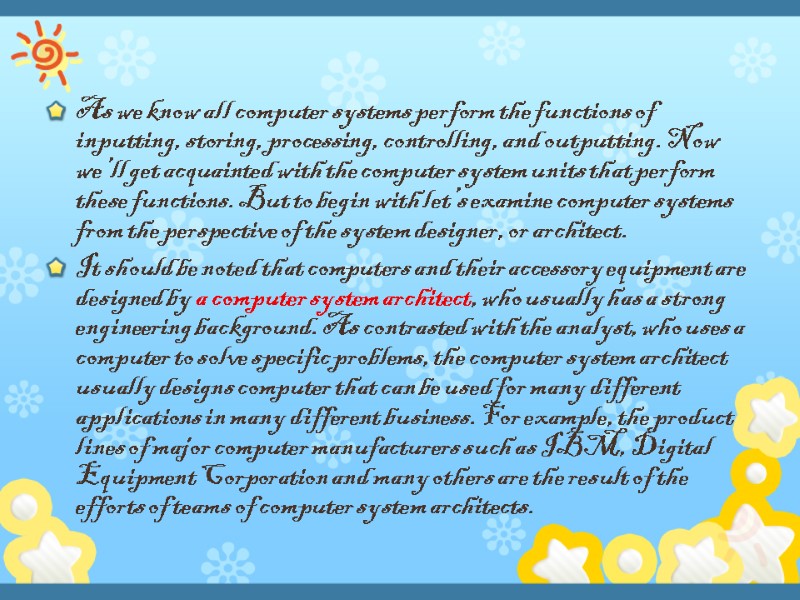
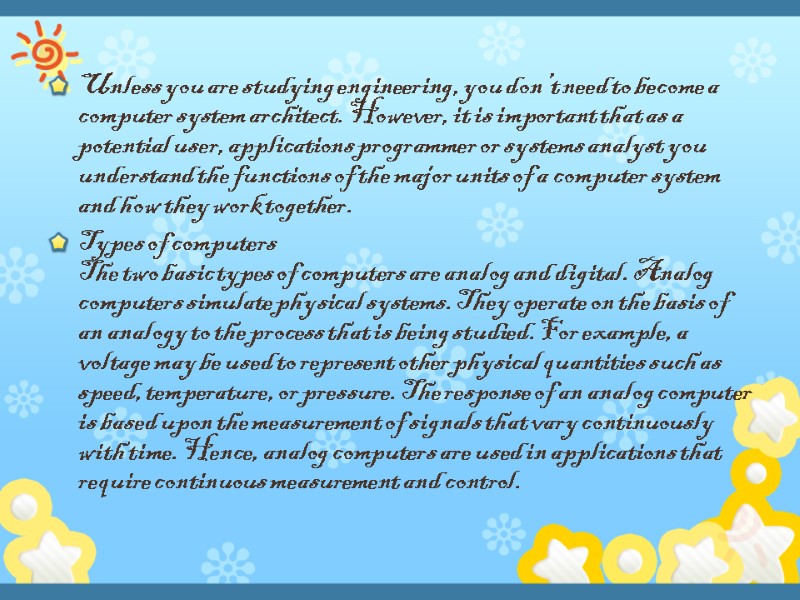
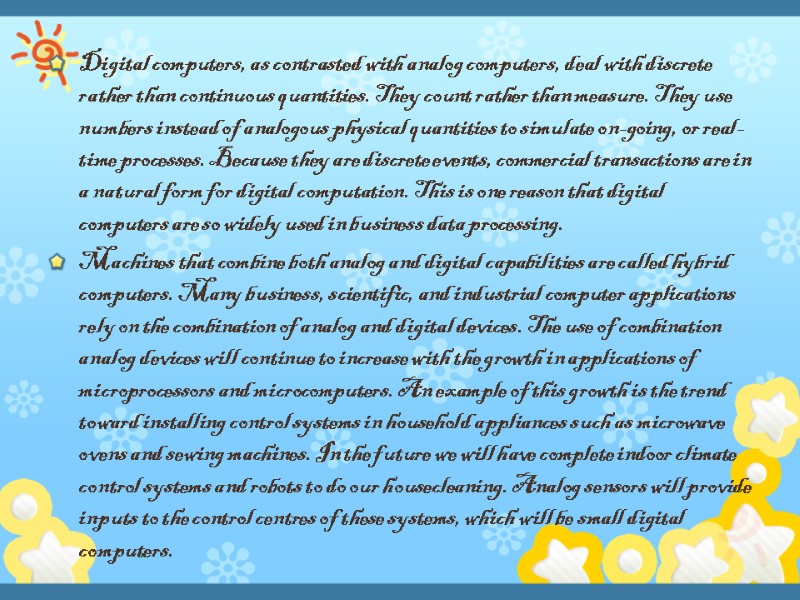
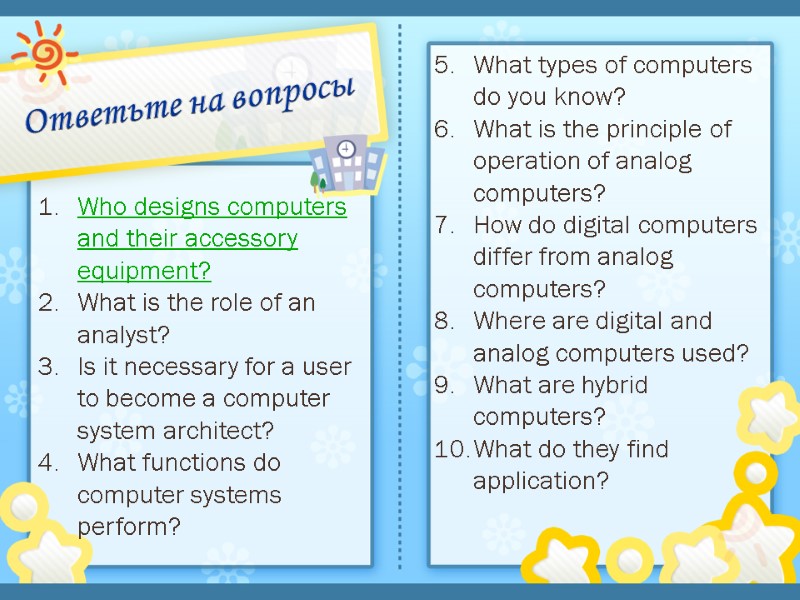

9584-computer_system_architecture.ppt
- Количество слайдов: 7
 Computer system architecture Text №1
Computer system architecture Text №1
 Термины текста architecture — архитектура; структура architect — разработчик архитектуры (системы, структуры) unit — устройство; модуль; блок; элемент; составная часть accessory equipment — вспомогательные устройства engineering background — техническая подготовка, квалификация analyst — аналитик; системный разработчик product line — серия (компьютерных) продуктов manufacturer — изготовитель; производитель; разработчик application programmer — прикладной программист to simulate — моделировать; имитировать voltage — напряжение pressure — давление, сжатие digital computer — цифровой компьютер hybrid computer — смешанного типа, аналого-цифровой компьютер discrete — дискретный; отдельный continuous quantity — непрерывная величина on-going process —продолжающийся, постоянный, непрерывный процесс to rely — основываться на ч.-л.; полагаться to install — устанавливать; размещать; монтировать; настраивать household appliances — домашние приборы / устройства microwave oven — микроволновая печь indoor climate control system — система регуляции температуры в доме
Термины текста architecture — архитектура; структура architect — разработчик архитектуры (системы, структуры) unit — устройство; модуль; блок; элемент; составная часть accessory equipment — вспомогательные устройства engineering background — техническая подготовка, квалификация analyst — аналитик; системный разработчик product line — серия (компьютерных) продуктов manufacturer — изготовитель; производитель; разработчик application programmer — прикладной программист to simulate — моделировать; имитировать voltage — напряжение pressure — давление, сжатие digital computer — цифровой компьютер hybrid computer — смешанного типа, аналого-цифровой компьютер discrete — дискретный; отдельный continuous quantity — непрерывная величина on-going process —продолжающийся, постоянный, непрерывный процесс to rely — основываться на ч.-л.; полагаться to install — устанавливать; размещать; монтировать; настраивать household appliances — домашние приборы / устройства microwave oven — микроволновая печь indoor climate control system — система регуляции температуры в доме
 As we know all computer systems perform the functions of inputting, storing, processing, controlling, and outputting. Now we’ll get acquainted with the computer system units that perform these functions. But to begin with let’s examine computer systems from the perspective of the system designer, or architect. It should be noted that computers and their accessory equipment are designed by a computer system architect, who usually has a strong engineering background. As contrasted with the analyst, who uses a computer to solve specific problems, the computer system architect usually designs computer that can be used for many different applications in many different business. For example, the product lines of major computer manufacturers such as IBM, Digital Equipment Corporation and many others are the result of the efforts of teams of computer system architects.
As we know all computer systems perform the functions of inputting, storing, processing, controlling, and outputting. Now we’ll get acquainted with the computer system units that perform these functions. But to begin with let’s examine computer systems from the perspective of the system designer, or architect. It should be noted that computers and their accessory equipment are designed by a computer system architect, who usually has a strong engineering background. As contrasted with the analyst, who uses a computer to solve specific problems, the computer system architect usually designs computer that can be used for many different applications in many different business. For example, the product lines of major computer manufacturers such as IBM, Digital Equipment Corporation and many others are the result of the efforts of teams of computer system architects.
 Unless you are studying engineering, you don’t need to become a computer system architect. However, it is important that as a potential user, applications programmer or systems analyst you understand the functions of the major units of a computer system and how they work together. Types of computers The two basic types of computers are analog and digital. Analog computers simulate physical systems. They operate on the basis of an analogy to the process that is being studied. For example, a voltage may be used to represent other physical quantities such as speed, temperature, or pressure. The response of an analog computer is based upon the measurement of signals that vary continuously with time. Hence, analog computers are used in applications that require continuous measurement and control.
Unless you are studying engineering, you don’t need to become a computer system architect. However, it is important that as a potential user, applications programmer or systems analyst you understand the functions of the major units of a computer system and how they work together. Types of computers The two basic types of computers are analog and digital. Analog computers simulate physical systems. They operate on the basis of an analogy to the process that is being studied. For example, a voltage may be used to represent other physical quantities such as speed, temperature, or pressure. The response of an analog computer is based upon the measurement of signals that vary continuously with time. Hence, analog computers are used in applications that require continuous measurement and control.
 Digital computers, as contrasted with analog computers, deal with discrete rather than continuous quantities. They count rather than measure. They use numbers instead of analogous physical quantities to simulate on-going, or real-time processes. Because they are discrete events, commercial transactions are in a natural form for digital computation. This is one reason that digital computers are so widely used in business data processing. Machines that combine both analog and digital capabilities are called hybrid computers. Many business, scientific, and industrial computer applications rely on the combination of analog and digital devices. The use of combination analog devices will continue to increase with the growth in applications of microprocessors and microcomputers. An example of this growth is the trend toward installing control systems in household appliances such as microwave ovens and sewing machines. In the future we will have complete indoor climate control systems and robots to do our housecleaning. Analog sensors will provide inputs to the control centres of these systems, which will be small digital computers.
Digital computers, as contrasted with analog computers, deal with discrete rather than continuous quantities. They count rather than measure. They use numbers instead of analogous physical quantities to simulate on-going, or real-time processes. Because they are discrete events, commercial transactions are in a natural form for digital computation. This is one reason that digital computers are so widely used in business data processing. Machines that combine both analog and digital capabilities are called hybrid computers. Many business, scientific, and industrial computer applications rely on the combination of analog and digital devices. The use of combination analog devices will continue to increase with the growth in applications of microprocessors and microcomputers. An example of this growth is the trend toward installing control systems in household appliances such as microwave ovens and sewing machines. In the future we will have complete indoor climate control systems and robots to do our housecleaning. Analog sensors will provide inputs to the control centres of these systems, which will be small digital computers.
 Ответьте на вопросы Who designs computers and their accessory equipment? What is the role of an analyst? Is it necessary for a user to become a computer system architect? What functions do computer systems perform? What types of computers do you know? What is the principle of operation of analog computers? How do digital computers differ from analog computers? Where are digital and analog computers used? What are hybrid computers? What do they find application?
Ответьте на вопросы Who designs computers and their accessory equipment? What is the role of an analyst? Is it necessary for a user to become a computer system architect? What functions do computer systems perform? What types of computers do you know? What is the principle of operation of analog computers? How do digital computers differ from analog computers? Where are digital and analog computers used? What are hybrid computers? What do they find application?
 Найдите эквиваленты Функции ввода, хранения, обработки, управления и вывода информации; познакомиться; системные блоки; для начала; вспомогательные устройства; разработчик компьютерной системы; хорошая компьютерная подготовка; различные сферы применения; корпорация цифрового оборудования; прикладной программист; системный разработчик; главные устройства компьютера; моделировать физические величины; измерения сигналов; в отличие от; иметь дело скорее с дискретными; чем непрерывными величинами; в режиме реального времени; коммерческие операции; цифровое вычисление; аналого-цифровые компьютеры; тенденция к установке систем управления; бытовые приборы.
Найдите эквиваленты Функции ввода, хранения, обработки, управления и вывода информации; познакомиться; системные блоки; для начала; вспомогательные устройства; разработчик компьютерной системы; хорошая компьютерная подготовка; различные сферы применения; корпорация цифрового оборудования; прикладной программист; системный разработчик; главные устройства компьютера; моделировать физические величины; измерения сигналов; в отличие от; иметь дело скорее с дискретными; чем непрерывными величинами; в режиме реального времени; коммерческие операции; цифровое вычисление; аналого-цифровые компьютеры; тенденция к установке систем управления; бытовые приборы.

